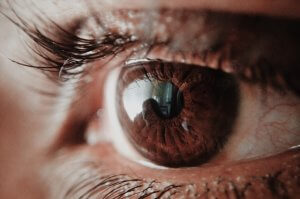Prevailing wisdom states that contact lenses are safer than LASIK for vision correction – but as time goes by, we’ve learned new things to challenge this belief. Board-certified ophthalmologist Dr. Brian Will notes that contact lens wearers are more likely than LASIK surgery patients to develop complications that eventually lead to vision loss. Based on…
-

Long-Term Safety of LASIK vs. Contact Lenses
-
Dry Eyes After Menopause
Menopause is a natural part of the aging process that marks the end of your menstrual cycle. During menopause, your body produces less androgen, progesterone, and estrogen, causing a host of uncomfortable symptoms – including hot flashes, sweating, insomnia, and for some women, dry eyes. Symptoms of Dry Eyes Dry eyes can be unpleasant, and…
-
Can Vaping Cause Eye Problems?
If you’ve been following headlines for the past few years, you’ve probably heard several conflicting things about vaping. While some people claim this habit is a “safe” way to smoke, lung disease and even death have links to vaping and e-cigarettes. Now, ophthalmologists are sounding the alarm that this type of smoking can harm people’s…
-
Do Your Sunglasses Provide Enough UV Protection?
Sunglasses are an accessory that’s practically synonymous with effortless fashion. Slipping on a pair of shades can immediately elevate your outfit to the next level, which explains why people are willing to pay top dollar for designer brand names like Kate Spade, Michael Kors, and Ray-Ban. While sunglasses are stylish, the best pairs should also…
-
LASIK Enhancement: When Additional Surgery Is Necessary
If you dream of being able to see clearly without the hassle and discomfort or contacts or glasses, you may be contemplating the benefits of LASIK eye surgery. Since this procedure has become so common, you likely have friends and relatives who have had LASIK and rave about the excellent results they’ve received from this…
-
What You Should Know About Using Artificial Tears for Dry Eyes Post-Lasik
Like most surgical procedures, Lasik requires additional care to help with recovery, healing, and discomfort after the surgery. Irritation and dry eyes are most people’s biggest concerns in the immediate period following their Lasik procedure. Luckily, a pocket-sized bottle of artificial tears is typically the extent of what you need to relieve these symptoms. But…
-
How to Prevent Foggy Glasses While Masking
Two years into this pandemic, there’s a nagging nuance troubling millions of Americans – how to stop their eyeglasses from fogging while wearing a mask to prevent the transmission of illness. What should you adjust? Your mask? Your glasses? Your breathing? Instead of making light of a problem so many people experience daily, we feel…
-
Will COVID-19 Affect Your Vision?
Like any inoculation against illness, the COVID-19 vaccination brings potential side effects, but they are different for everyone. These are typically mild and signify your immune system is working hard to recognize the virus, so it can protect you. After a COVID-19 vaccination or booster shot, many people experience soreness around the injection site, fatigue,…
-
Can LASIK Reduce the Need for Reading Glasses?
Though aging brings various challenges, needing reading glasses is a constant aggravation for many. If you hope to see things like recipes, directions, and labels clearly, you need your glasses close to hand, but they never seem to be around when you need them. But is LASIK eye surgery an answer for such a trivial…
-
5 Things to Do Before and After LASIK Eye Surgery
When considering LASIK surgery, there are some necessary to-dos to prepare for the procedure and ensure a successful recovery. At Will Vision and Laser Centers in the Pacific Northwest, Dr. Brian Will consults with his patients to provide valuable information for the best LASIK experience, which includes proper preparation and after-surgery care. Here is a…








